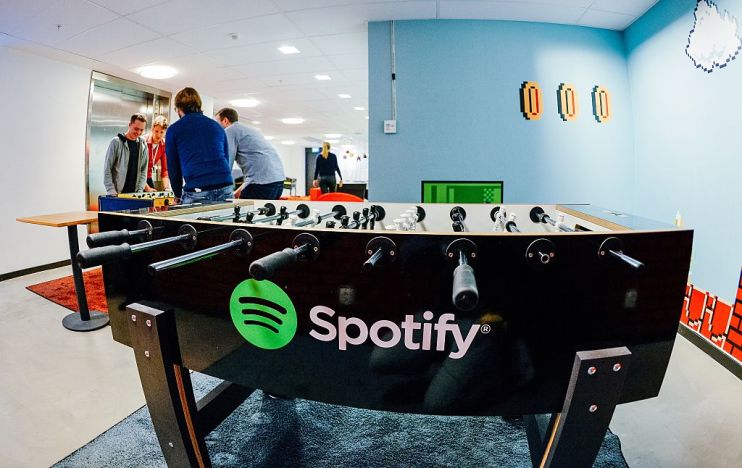Spotify grows user numbers as Covid-19 hits advertising revenue

Spotify today reported a sharp rise in user numbers for the first quarter as coronavirus lockdown measures sparked a huge shift in listening habits around the globe.
The streaming service posted a 31 per cent year on year growth in monthly active users to 286m. The figures, which were in line with expectations, marked the third consecutive quarter of growth above 30 per cent.
Total revenue grew 22 per cent over the period to €1.8bn (£1.6bn), driven by a strong rise in premium revenue from subscribers to €1.7bn.
However, Spotify was hit by a downturn in the wider advertising market. Ad-supported revenue grew 17 per cent to €148m, but fell short of the firm’s expectations.
The Swedish music giant said the impact of Covid-19 had been hardest in the final three weeks of the quarter, when ad revenue was down more than 20 per cent.
Operating loss for the quarter was €17m, down from €47m in the same period last year.
Shares in Spotify were down marginally in pre-market trading in New York.
Spotify said Covid-19 had had a limited impact on its own business, though the firm will scale back hiring plans for the remainder of the year.
However, the crisis has sparked a huge shift in listening habits. “It’s clear from our data that morning routines have changed significantly. Every day now looks like the weekend,” the company said.
Spotify said morning listening — especially podcasts — had fallen due to a reduction in commuting, while listening around such as cooking and doing chores had risen.
Coronavirus-related anxiety was also reflected in increased searches for “chill” and “instrumental” music, as well as for wellness and meditation podcasts.
Spotify, which generates the vast majority of its revenue of subscribers, has focused on trying to convert ad-supported users into paid members.
The firm increased premium subscribers 31 per cent over the quarter to 130m, driven largely by the success of its family plan. It has also launched Spotify Kids for children aged three or over, as well as its duo offering — a premium plan aimed at couples.
In addition, the music company has ramped up its focus on podcasts in a bid to cash in on the surging popularity of on-demand listening.
Last year Spotify splashed out at least €300m to buy three podcast startups, and has since added sports and pop culture platform The Ringer to its portfolio.
The company said it launched 78 original and exclusive podcasts over the quarter, and now has more than 1m shows on its platform. However, podcasts have suffered a hit from the Covid-19 crisis, with the lockdown prompting a slowdown in new show production.
Jovan Buac, senior client director of consumer brands at Landor, said Spotify was one of the “lucky” brands seeing an increase in usage, share and value.
“We’ve seen it before and we will surely see it again – during times of adversity, we turn to brands whose products and services fulfil our needs as consumers, in meaningful ways,” he said. “Spotify is surely one of those and as a result will no doubt have a closer bond with its users post crisis.”
Spotify forecast total user numbers of between 289m and 299m in the second quarter, with revenue between €1.75bn and €1.95bn.
The company downgraded its full-year revenue guidance to €7.65bn to €8.05bn from €8.08bn to €8.48bn as a result of the hit to advertising from Covid-19, but maintained its forecasts for other metrics.